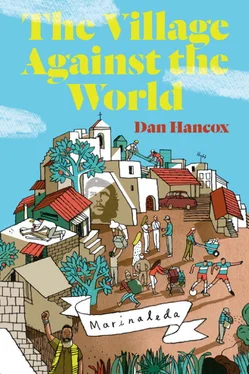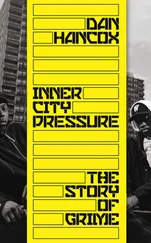‘But Sánchez Gordillo right now – he’s not well, is he?’ I asked, slightly tentatively. It’s been a very stressful time for him, with all the media attention? ‘Yes, but to be fair, he was asking for it,’ said Paco. Paco was right – it was never foisted upon the Robin Hood mayor; he chose that path, because of his belief in the struggle, rather than egotistical self-belief. ‘He’s a … peculiar character,’ he said eventually, after casting around for the right word. Then he checked himself, wondering if peculiar was what he meant. ‘He’s brave, so brave.’
Before returning to London for Christmas, I wrote to one of the mayor’s CUT colleagues, to enquire one last time if I could meet Sánchez Gordillo again. ‘Dan,’ he wrote back, ‘it is impossible now. He is very sick. I hope you can speak with him in January when you come back. I hope you understand, please.’ The walls were going up around the pueblo . They were fobbing off all requests to see him – whether from the media, documentary-makers, or people wanting to build political bridges from other villages; but his friends and comrades seemed genuinely confident that he just needed a quiet few weeks over the holidays, and he’d be better in the New Year.
Back in London in January, one friend in Marinaleda wrote to me to bring me up to speed. ‘Juan Manuel is still keeping quiet and any general assemblies are taken by others and are short and only about work. The financial situation is very bad everywhere and there is no light at the end of the tunnel. Someone told me they think that Juan Manuel is suffering more because he is powerless to alter the position and cannot see a way forward. Even if you can speak to him, I doubt it would be very satisfactory … Not much else happening.’
The mood was increasingly sombre. At one general assembly, one of the CUT village councillors, Dolores, had to give the bad news that there would be reduced rates for the annual olive-picking harvest. Some of the jornaleros at the meeting thought it would barely cover their travel costs.
When I returned to the village in February 2013, Sánchez Gordillo was still absent. As Antonio made up my room, fitting the sheets with fastidious speed and precision, he asked what I still needed to do on this visit. I mentioned a few things, and that of course, it would be good to speak to el alcalde one more time, if possible. He sighed and said, ‘Well, good luck. He’s still a bit poorly.’
On the second Saturday in February we went to Marinaleda’s neighbour pueblo El Rubio for their pre-Lenten carnaval , on the last Saturday before Lent; it was a very early Easter this year, and thus a very cold carnaval . At 7 pm, just after the peach skies turned to blue dusk, the procession began winding through the small town’s confusing melee of streets. Just as in Marinaleda, groups of friends wear co-ordinated fancy dress costumes, and there were jellyfish, superheroes, SpongeBob characters, Smurfs, mermaids, cowboys and cross-dressing schoolgirls parading with large measures of rum and coke in hand. The town’s parents and grandparents looked on admiringly in warm coats and scarves as the temperature under the cloudless sky abseiled towards zero.
Eventually the parade stopped in El Rubio’s Blas Infante park. More drinks were poured, and an eight-piece band of brass and drums competed with a sound system blaring out Spanish dance-pop. As the dusk faded into black and the crowd got progressively merrier, drunken arms were flung around shoulders, and the dancing began – and there, in among the throng, clear as day, was Sánchez Gordillo. After months of absence and confusion, there he was: finally, unmistakably, the Robin Hood mayor, in his red check shirt, keffiyeh, straw hat and tumorous moss of a beard. He had obviously decided to come back to public life in the most befitting way for a man of the people: amid the sociable tumult of the crowd. It was so good to see him out and about again, holding his loud-hailer, leaning on a shopping trolley of supermarket goods – just like in the expropriations the previous summer.
I did a double take. There was Sánchez Gordillo. And there he was again. And again. There were four, no wait, five, no wait, six Sánchez Gordillos. Three of them were having their photo taken with a man in a ‘sexy nurse’ outfit. One of their beards had fallen off and seemed to be tied to a piece of string. Another one was chatting up one of the mushrooms from the Super Mario Brothers. If this was propaganda of the deed, it was starting to look silly.
I probably shouldn’t have been surprised that Sánchez Gordillo was self-replicating in this way, inspired by Los Gordillos, the Cadiz chirigota group. The real people’s leader seemed to be absent, but his spirit lived on in ludic fancy dress. At Marinaleda’s carnaval the following Saturday night, no one was so disrespectful as to reduce their icon – and elected leader – to a caricature. But in his absence he loomed over the pueblo and lingered in the air, in half-heard conversations from across the bar, dominating without ever being seen. It seemed to elevate the ominous atmosphere all the more because the locals, many of them friends and comrades of decades’ standing, kept referring to him by the honorific title el alcalde , not as Juan Manuel.
Midway through a long evening and late night of carnival festivity, we were on our fifth or sixth drink in the Sindicato union bar. I had given in to the repeated insistence from local friends that it didn’t matter that I was a) a journalist and b) a foreigner, I had no choice about wearing a costume for carnival. So I was sipping my beer in a monstrous (and unseasonal) Wise Man outfit I’d bought for fifteen euros, trying not to feel self-conscious about being a six-foot-four outsider in a big, flowing, polyester green and turquoise dress, with a homemade silver crown balanced on my head, and a wig of long silvery hair.
The 10 pm La Liga kick-off was on the big screen, and local underdogs Granada were somehow beating the mighty Barcelona. Marinaleños of all ages mingled happily, tapped their cigarette ash on the floor, and occasionally nodded their heads to the music drifting in from the assembly hall next door, as children hared in and out of the room playing tag.
Just as Barcelona were equalising, someone nudged me gently and leaned in as if imparting a secret. ‘Look. It’s el alcalde .’ It was him – actually him this time, talking to a couple on the other side of the bar. He was looking, uncharacteristically, both thin and awkward. Slowly, he circulated the room. Everyone shook his hand and smiled, the older marinaleños placed a tender arm on his shoulder – you’re looking better, they said – and he smiled and looked a bit shy, a bit overwhelmed, like someone who remembered once having a different relationship with these people, now forgotten. When he reached our part of the room, I greeted him, and we exchanged a few words about my book. He was polite but uncomfortable, like a recently released hostage who had just been let out into the light again and was feeling his way back into social situations.
It had only been a brief outing, and once he’d shown his face, he was gone again. Little changed throughout the spring; he was absent during the semana cultural in Easter week, absent from sports and cultural events, and absent from general assemblies and council meetings. The work of the mayor continued to be carried out by his fellow councillors, who waited and hoped for the pall to pass. The bond of trust and solidarity – and ultimately, silence – around the pueblo held firm; none of the Spanish right-wing commentators who had been baying for his blood the previous August had even noticed the miniature crisis in Marinaleda. At the very least, Sánchez Gordillo’s illness hastened the urgency of questions the village had been ignoring for years: what would happen when their talisman, their leader and comrade, was gone? Could Gordillismo survive without Gordillo, or was he the magic potion that powered the pueblo ?
Читать дальше












